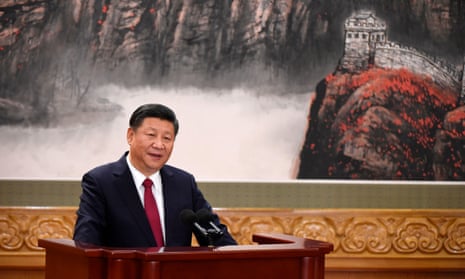China has trumpeted this week’s pomp-filled Communist party congress as an example of its increasing openness and transparency.
But a number of major western news organisations whose coverage has irked Beijing were excluded from Xi Jinping’s unveiling of China’s new ruling council on Wednesday – in some cases for the first time in more than two decades.
Those refused access to Xi’s statement to the media include the BBC, the Financial Times, the Economist, the New York Times and the Guardian. Chinese officials offered no formal explanation for the decision.
The Daily Telegraph, which regularly publishes Communist party propaganda in the UK as part of a reported £800,000 annual contract with Beijing’s China Daily, is understood to have been granted an invitation to Xi’s event.
In a statement, the Foreign Correspondents Club of China (FCCC) said it was concerned about the exclusions.
“The press conference is a high profile news event involving China’s top leadership and it is hard to avoid the conclusion that these media organisations have been singled out to send a message,” it said.
“Using media access as a tool to punish journalists whose coverage the Chinese authorities disapprove of is a gross violation of the principles of press freedom,” the group added.
Qiao Mu, a former journalism professor at Beijing Foreign Studies University who recently went into self-imposed exile in the United States, said China appeared to have barred those it considered “trouble makers”. The move reflected the frustration of Chinese officials at Xi’s inability to “control the tone of the western media”.
“The situation will get worse ... more and more western media websites will be blocked, and journalists will be expelled or [find it] hard to get visas,” Qiao added. He said that in Xi’s “new era” there was room for only “one voice”.
In his address to handpicked journalists on Wednesday, Xi said: “The party congress has received extensive and detailed reporting from our friends in the press, with many of you coming from afar. You have worked very hard and your media coverage has captured the attention of the world. I want to say a big thank you to you all.”
However, he also issued a thinly-veiled rebuke to foreign journalists who publish reports that question the party line.
“We do not need lavish praise from others. However, we do welcome objective reporting and constructive suggestions.”
Xi borrowed the words of Yuan dynasty poet, Wang Mian, to hammer his point home: “Not angling for compliments, I would be content that my integrity fills the universe.”
Beijing has attempted to contrast its supposedly open congress with Donald Trump’s hostility towards the media.
“The Party congress has become more open and transparent, which reflects the growing confidence of the ruling party of a large country like China,” Dong Guanpeng, the head of the media and public relations institute at the Communication University of China told Xinhua, China’s official news agency.
A series of heavily scripted “press conferences” have been organised, which were attended by a large number of foreign reporters on the payroll of party-run media outlets. Many of the questions appeared to have been pre-screened.
“There is great access and openness at the Party congress, whereas in the United States, the administration is closed in a way that they don’t want media attention or criticism,” Xinhua quoted an American journalist, Sarah Wendt, as saying.
According to her Twitter profile Wendt works for Sinovision, a US-based television channel with ties to China’s party-run CCTV and which describes itself as “the leading and most dominant Chinese-language TV station in the Metropolitan New York area”.
China-based correspondents say the treatment of foreign journalists appears to have deteriorated since Xi took power in 2012 and began a wide-ranging crackdown on opposition voices.
Last week the Global Times, a party-controlled tabloid, accused the western media of “misleading” and “incorrect” coverage of China.
“[Some] Western journalists do not show professionalism in their coverage and their reporting remains ideologically superficial and does not get the gist of China’s new era,” it claimed.
Asked about the exclusions, China’s foreign ministry spokesman, Geng Shuang, said: “What I can tell you is that we welcome foreign journalists to interview and report on the 19th party congress and handle foreign journalists’ applications according to laws and regulations.”
In a statement to AFP the congress’ media centre said it had “tried [its] best to allow more foreign journalists to attend this event”.
“We hope to welcome those who truly care about China’s development; who can provide objective, impartial and balanced coverage; who are truly concerned with the future direction of Chinese policy to come report on our events,” the statement said.
Additional reporting by Wang Zhen
